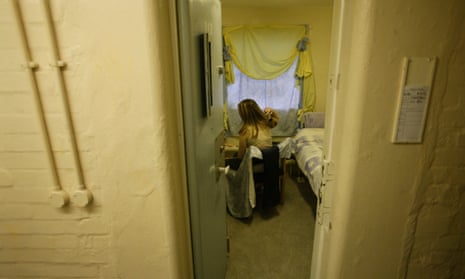Chris Tchaikovsky – queen of charisma, 6ft tall, witty, clever, the only one of six middle-class sisters to serve time in prison – was, for a period, head of the Happy Firm, a team dealing in stolen travellers’ cheques. Then she went straight, co-founding the charity Women in Prison. She died, aged 57, in 2002, but on Wednesday, her spirit will be at Westminster as women come to lobby their MPs to invest in a different kind of justice – one that works.
A year ago this week, the government published its female offender strategy. It contained much of what Tchaikovsky campaigned for over decades. The strategy says that if justice is to be delivered and reoffending reduced, prison for women, the majority of whom (85%) commit non-violent offences, should be replaced. In its stead should come sentences in the community and intensive support to address the issues common to chaotic lives – addiction, trauma, debt, homelessness. By and large, it’s not posh people who do porridge.
Last week, the Farmer review into maintaining ties between prisoners and families also commended women’s centres and specialist services in the voluntary sector that deliver the kind of support that turns around lives. They do so by investing in the assets that women have, rebuilding trust in relationships and addressing trauma, substance misuse and the scars inflicted by poverty at a fraction of the cost of prison.
Farmer also warned that women’s centres, battered by Chris Grayling’s disastrously costly “reforms”, are in a financially precarious state. Hence the lobby on Wednesday and the launch of a 10-point manifesto, #OPENUP Women’s Futures. Demands include that the £80m accrued from the sale of HMP Holloway should be invested in women’s centres and support services and that there should be a legal presumption against the imposition of short sentences.
The government is to be commended. Its commitment to radical penal reform is on record. But without adequate resources, this ineffectual, hugely expensive and damaging system will continue to fall apart, as Tchaikovsky warned decades ago.
I first met her in the 1980s, not long after she and criminologist Pat Carlen set up Women in Prison (WIP), of which I am now chair. One of the first miscarriages of justice we worked on was that of Susan, a young woman who was in the dock because she had neglected her two children. The baby had died, the two-year-old was close to death. They and Susan were found in appallingly squalid conditions. Susan was given a much longer sentence than her husband because the judge said she ought to have had maternal feelings.
Susan had been in care and sexually abused as a child. As a teenager, she met her husband who was twice her age and violent. He went to work each day while Susan, on a cocktail of antidepressants and with a history of mental illness, struggled with her fear of him and acute postnatal depression.
After her arrest, she was so seriously disturbed that she was sectioned for several months before coming to trial. Few of the factors that had led to the devastating neglect of her children were taken into account. She was branded a monster by the media and found guilty of murder, not manslaughter. Tchaikovsky successfully fought to have Susan’s sentence reduced on appeal. In the years since then, I’ve learned that Susan’s experiences of abuse, trauma, domestic violence and mental ill-health are common for so many of the 8,000 women a year in England and Wales who are sent to prison (around 5% of the total prison population) mainly for offences such as shoplifting, theft and non-payment of fines.
Three-quarters of women sent to prison in England and Wales serve sentences of under 12 months, 25% under a month; more than 70% serving short sentences will reoffend within a year. The pattern is similar in Scotland. A few weeks in jail is long enough to lose your children into care and your home. Baroness Jean Corston, in her groundbreaking report into women with vulnerabilities in prison, published 12 years ago after rising deaths in prison – which continue to rise now – detailed how prison affects women differently. In a speech last year, she said that a woman rarely escapes from prison. If she did, she would be easily found: “She would try to be with her children.”
“Taking the most hurt people out of society and punishing them in order to teach them how to live within society is futile,” said the late Tchaikovsky. “Whatever else a prisoner knows, she knows everything there is to know about punishment because that is exactly what she has grown up with. Whether it’s childhood sexual abuse, indifference or neglect – punishment is most familiar to her.”
On Wednesday, MPs will be told by women from women’s centres and voluntary organisations that it’s time to invest in a system that can deliver justice, that breaks the cycle and gives women and their children the chance of a life after punishment. “If government invests now, it could set an international example in how to reduce the human and financial cost of imprisonment and create healthier and safer communities,” says Kate Paradine, WIP’s CEO. “This is in our power.”
Yvonne Roberts is a journalist and broadcaster, and the outgoing chair of Women in Prison.
This article was amended to say that women make up around 5% of the prison population of England and Wales.
Comments on this piece are pre-moderated to ensure discussion remains on topics raised by the writer. Please be aware there may be a short delay in comments appearing on the site.

